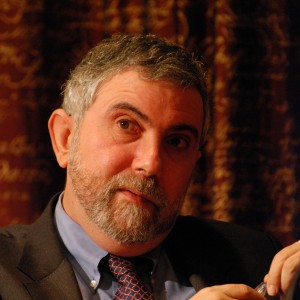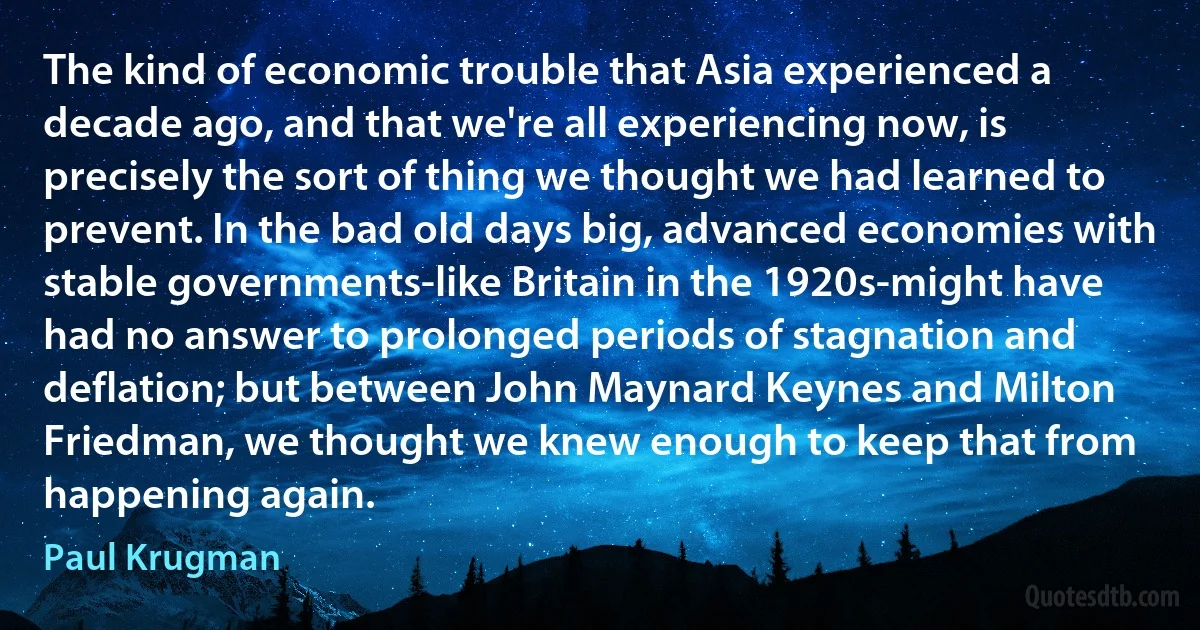Paul Krugman quotes - page 2
It's tempting to give up-either to retreat to the ivory tower, or to start to play the policy entrepreneur game. After all, what is the use of sophisticated policy thinking or careful examination of the facts if simplistic ideas win every time?
One answer is simply that it would be wrong to give up. If the people with good ideas do not fight for them, they have no right to complain about the outcome.
But good ideas will still often lose to convenient nonsense. When that happens, every serious economist is ultimately sustained by a faith that the right ideas will eventually prevail.

Paul Krugman
I do not mean to say that formal economic analysis is worthless, and that anybody's opinion on economic matters is as good as anyone else's. On the contrary! I am a strong believer in the importance of models, which are to our minds what spear-throwers were to stone age arms: they greatly extend the power and range of our insight. In particular, I have no sympathy for those people who criticize the unrealistic simplifications of model-builders, and imagine that they achieve greater sophistication by avoiding stating their assumptions clearly. The point is to realize that economic models are metaphors, not truth. By all means express your thoughts in models, as pretty as possible (more on that below). But always remember that you may have gotten the metaphor wrong, and that someone else with a different metaphor may be seeing something that you are missing.

Paul Krugman
The hangover theory, then, turns out to be intellectually incoherent; nobody has managed to explain why bad investments in the past require the unemployment of good workers in the present. Yet the theory has powerful emotional appeal. Usually that appeal is strongest for conservatives, who can't stand the thought that positive action by governments (let alone-horrors!-printing money) can ever be a good idea. Some libertarians extol the Austrian theory, not because they have really thought that theory through, but because they feel the need for some prestigious alternative to the perceived statist implications of Keynesianism. And some people probably are attracted to Austrianism because they imagine that it devalues the intellectual pretensions of economics professors. But moderates and liberals are not immune to the theory's seductive charms-especially when it gives them a chance to lecture others on their failings.

Paul Krugman
One interesting footnote: although Friedman made great strides in macroeconomics by applying the concept of individual rationality, he also knew where to stop. In the 1970s, some economists pushed Friedman's analysis of inflation even further, arguing that there is no usable trade-off between inflation and unemployment even in the short run, because people will anticipate government actions and build that anticipation, as well as past experience, into their price-setting and wage-bargaining. This doctrine, known as "rational expectations,” swept through much of academic economics. But Friedman never went there.

Paul Krugman
The appeal to the intellectually insecure is also more important than it might seem. Because economics touches so much of life, everyone wants to have an opinion. Yet the kind of economics covered in the textbooks is a technical subject that many people find hard to follow. How reassuring, then, to be told that it is all irrelevant -- that all you really need to know are a few simple ideas! Quite a few supply-siders have created for themselves a wonderful alternative intellectual history in which John Maynard Keynes was a fraud, Paul Samuelson and even Milton Friedman are fools, and the true line of deep economic thought runs from Adam Smith through obscure turn-of-the-century Austrians straight to them.

Paul Krugman
It's a tribute to the importance of Friedman's work that questions about his legacy bear so directly on contemporary policy issues. But for that reason it's also important not to engage in hagiography. Friedman was a great economist, but like every other great economist in history, he was also wrong about some important things.

Paul Krugman
The legend of King Midas has been generally misunderstood. Most people think the curse that turned everything the old miser touched into gold, leaving him unable to eat or drink, was a lesson in the perils of avarice. But Midas's true sin was his failure to understand monetary economics. What the gods were really telling him is that gold is just a metal. If it sometimes seems to be more, that is only because society has found it convenient to use gold as a medium of exchange-a bridge between other, truly desirable, objects. There are other possible mediums of exchange, and it is silly to imagine that this pretty, but only moderately useful, substance has some irreplaceable significance.

Paul Krugman
The best you can say about economic policy in this slump is that we have for the most part avoided a full repeat of the Great Depression. I say "for the most part” because we actually are seeing a Depression-level slump in Greece, and very bad slumps elsewhere in the European periphery. Still, the overall downturn hasn't been a full 1930s replay. But all of that, I think, can be attributed to the financial rescue of 2008-2009 and automatic stabilizers. Deliberate policy to offset the crash in private spending has been largely absent.

Paul Krugman
It's a great honour to be asked to give this talk, especially because I'm arguably not qualified to do so. I am, after all, not a Keynes scholar, nor any kind of serious intellectual historian. Nor have I spent most of my career doing macroeconomics. Until the late 1990s my contributions to that field were limited to international issues; although I kept up with macro research, I avoided getting into the frontline theoretical and empirical disputes.

Paul Krugman
International trade in goods and services has expanded steadily over the past six decades thanks to declines in shipping and communication costs, globally negotiated reductions in government trade barriers, the widespread outsourcing of production activities, and a greater awareness of foreign cultures and products. New and better communications technologies, notably the Internet, have revolutionized the way people in all countries obtain and exchange information.

Paul Krugman
Paul Krugman
 Occupation: American Economist
Occupation: American Economist
Born: February 28, 1953
Quotes count: 150
Wikipedia: Paul Krugman












